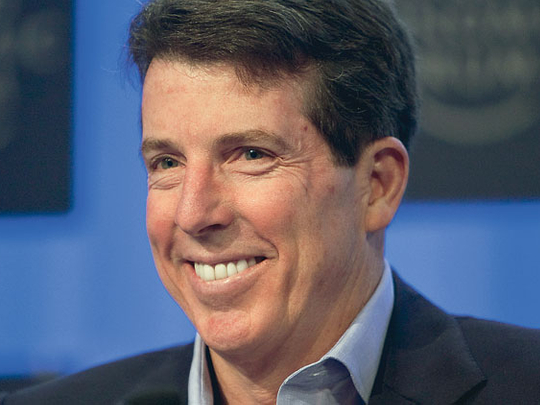
Davos: The man who joined me is the man who kind of started that debate in Davos. He's the chief executive of Barclays Bank. And that is Bob Diamond.
John Defterios: So, a lot has transpired. Now, I know the speech was given overnight and you probably got some messages coming in from your team in New York, kind of providing some interpretation. But it's the pace of regulation and intensity of it. They're looking at a six-month timeline. Is that realistic to you?
BOB DIAMOND: Yes, I think a couple of things, John. And you're right, I didn't stay up and watch the speech. But I saw some of the replays this morning. And I think the priority that President Obama gave to the labour markets and getting employment going is consistent with financial regulation. And I think making the financial system safe and sound, but also in an environment that's conducive to job creation and economic growth is critical. On that timeline, I think it's really important that the US tries to integrate as closely as they can with the G20 initiatives, particularly around capital, around leverage and around liquidity. Because I think it's incredibly important that we have a level playing field between the major economies and the major financial centres.
OK, you raise a couple of good points, but one I want to raise first before we go to the G20 is the level of that bill going through Congress. Can it get through, and will it intervene in proprietary trading and really kind of come into the bank and say what you can trade and what you cannot trade?
Well, I think some of the things that President Obama and Volcker announced have real clarity around whether banks can or cannot hold equity investments in other firms. I think around proprietary trading, there's a lot more to work out of exactly what that means. I think in the case of Barclays, we made a decision a decade ago in 1998 to exit separate proprietary trading and to focus on our client flows and our client businesses. So, it doesn't have a big impact on us, but I think in terms of the industry, we need more clarity about exactly the separation between what's client and what's proprietary. It's a bit murky right now.
If President Obama was here — President Sarkozy is here at this stage in terms of what he's talking about within the framework of the G20, you could have a populous fervour where this just kind of runs like a train at a very high speed, and you could be behind that train and not getting the sense of the sentiment within the populations around the world who are very frustrated by the banks right now, as you know.
Listen, we all understand there's anger at the banks. And, you know, there's a number of banks that didn't take any direct government money. We're a very good example. But we also recognise both our obligation and our responsibility to be constructive, to work with the regulators, to work with the central banks. The banks do get it. We've increased our capital levels, we've reduced our leverage, we've increased our pools of liquidity. And we want to work constructively, as I said, with the regulators, with the central banks, with the legislatures toward the appropriate and effective financial regulation.
I spoke to one central banker who was in private banking before, coming back into that landscape in government who said investment banking and commercial banking should be completely spread apart in consumer banking. Divided. In fact, it pollutes consumer banking. Would you agree with that?
No, I think it's a lot of people have thrown out Glass-Stegall. Very few people even know what it means. And I think the important thing is, why have banks grown? Why are banks bigger today? It's not because they thought bigger was better. It's because our clients have grown. In the post-Communist world, free trade has grown. In America, we have driven many of these free-trade initiatives. And as our clients have grown, as so many of our corporates have operations in multiple locations, have raw materials coming in from multiple locations, have shareholders in multiple locations, it's important to have banks like Barclays that can help our clients' pension funds and corporates as well as governments transfer risk across borders.
Well, some would argue that you have intensified the risk because many of those pension funds don't know what they're buying, right? They really don't understand the products.
And I think that's why it's so important, John, that we work constructively around what is the right levels of capital. What we saw quite frankly in the past was regulatory arbitrage. AIG's ability to have a derivatives business in an unregulated subsidiary…..
So, that has to be closed.
That has to be closed. And that's why we need to work together. And I think the capital rules are a strong step in that direction to determine what's the appropriate level of capital to hold against the risk in the banks. And importantly to make that consistent amongst the major economies in the world.
We appreciate your coming in. And we also appreciate you sparking the debate yesterday, because it's gone all around the globe in the last 24 hours. Nice to see you.
John Defterios is the host of CNN International's Marketplace Middle East
Tune in to CNN International each evening at 20.00 CET to catch Richard's show, Quest Means Business. For more information on Davos, visit cnn.com/davos












